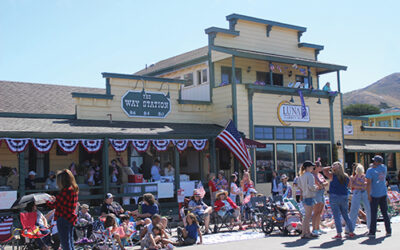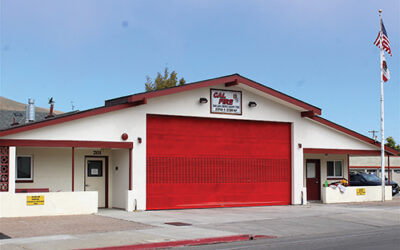A group of citizens circulating petitions to place on the ballot a parcel tax on private property to support maintenance of City-owned harbor facilities has a new web page if residents want to learn more.
The Friends of the Morro Bay Harbor Department, a non-profit organization that raises money to support the Harbor Department, has launched a web page on its official site (see: friendsofthembhd.org) that discusses the “Harbor Infrastructure Parcel Tax Initiative,” which a trio of local businessmen developed and are working to get placed on the November 2022 General Election Ballot.
The leaders of the effort are Bill Luffee, Homer Alexander and Ron Reisner.
Luffee is a former Harbor Advisory Board chairman and started the Friends group. Reisner, a marine surveyor by profession, is also a former HAB member and chairman and Alexander is a former City Financial Committee member who has long been involved in local politics and worked to get Measure Q — a half-cent sales tax measure passed in 2006. M-Q was intended to provide money to support the police and fire departments, street and storm drain repairs.
The three had been discussing ways to raise revenues for the Harbor Department, which gets all of its money through lease payments for Tidelands Trust properties, slips and dockage fees. It’s not nearly enough to pay for all of the department’s unmet needs.
“There is just enough revenue to fund a streamlined Harbor Department [public safety] operation, with very little leftover for harbor infrastructure maintenance,” the website reads, “much less needed harbor infrastructure replacement.”
The web page goes on to note that with the exception of the rebuilding of the South T-pier, which was destroyed in an October 1988 fire that destroyed 13 boats and killed two people, the harbor hasn’t gotten much investment.
It lists some of the current high-ticket maintenance items that need to be addressed, including:
• Piers and wharfs — $600,000;
• Seawalls — $3.4 million;
• Revetments — $1.6 million;
• Docks and slips — $50,000; and,
• Restrooms — $1.5 million; for a total of $7.15 million “for those items alone.”
It also lists unfunded liabilities for replacement of certain facilities to include $6.14 million to replace old docks and slips, and $2.2 million to repair the public launch ramp.
The Harbor Department has been trying to put together a project to rebuild the launch ramp, which has huge holes in the concrete ramp and side docks that are tweaked and rotted and need replacing. That project also seeks to build a new fish cleaning station and add a new ramp specifically designed for launching kayaks.
These two items total some $8.34M and the list is by no means complete, either.
With funding holes like these, it’s fairly obvious that with the current funding scheme, the department may never catch up and facilities will further deteriorate.
The petition drive is ongoing and the proponents have until May 9 to gather the 827 valid signatures of Morro Bay registered voters, to be placed on the November 2022 ballot.
Alexander in a previous EBN article (Dec. 16, 2021) said, “This has been going on for years,” adding there’s been a lot of talk about the problem but nothing gets done.
Indeed for several years, since 2014 when the Harbor Department lost a $250,000 a year lease payment from the power plant owners, the City Council has over and over again discussed how to increase revenues for the harbor.
They green-lit putting in a parking kiosk at the launch ramp and charge for day use parking of trucks and boat trailers in the launch ramp parking lot; and allowed a pilot program to establish a handful of RV camping sites at three locations on The Embarcadero, which has gone well but is in trouble.
Though the City has applied to the Coastal Commission for a coastal development permit (CDP) to make the camping program permanent, a citizen’s initiative has been qualified for the ballot that would ban the RV camping along the Embarcadero and at Morro Rock.
With many options to raise revenues that have been floated over the years, Reisner said they looked at them all before deciding to try for a parcel tax. “The three of us,” Reisner said, “kicked the issue around and drafted basic concepts, then we sent it to our attorney to ‘legalize’ it.”
What’s emerged is a proposal to set a tax of $120 per year on all privately owned property within the City Limits, both residential and commercial. It works out to $10 a month and would be added to property tax bills, which are normally paid semi-annually, and collected and dispersed through the County Tax Collector’s Office.
Because it is a citizen’s initiative, it needs 50-percent plus-1 vote to pass. If it were the City Council promoting it, and because there is a specific use for the monies, it would need two-thirds majority to pass.
But asking voters to tax themselves is always an iffy proposition and as it is a citizen’s initiative, neither the city council nor the staff nor can play an active part in the campaign.
If readers want to learn more about the harbor infrastructure parcel tax initiative, see: friendsofthembhd.org.


